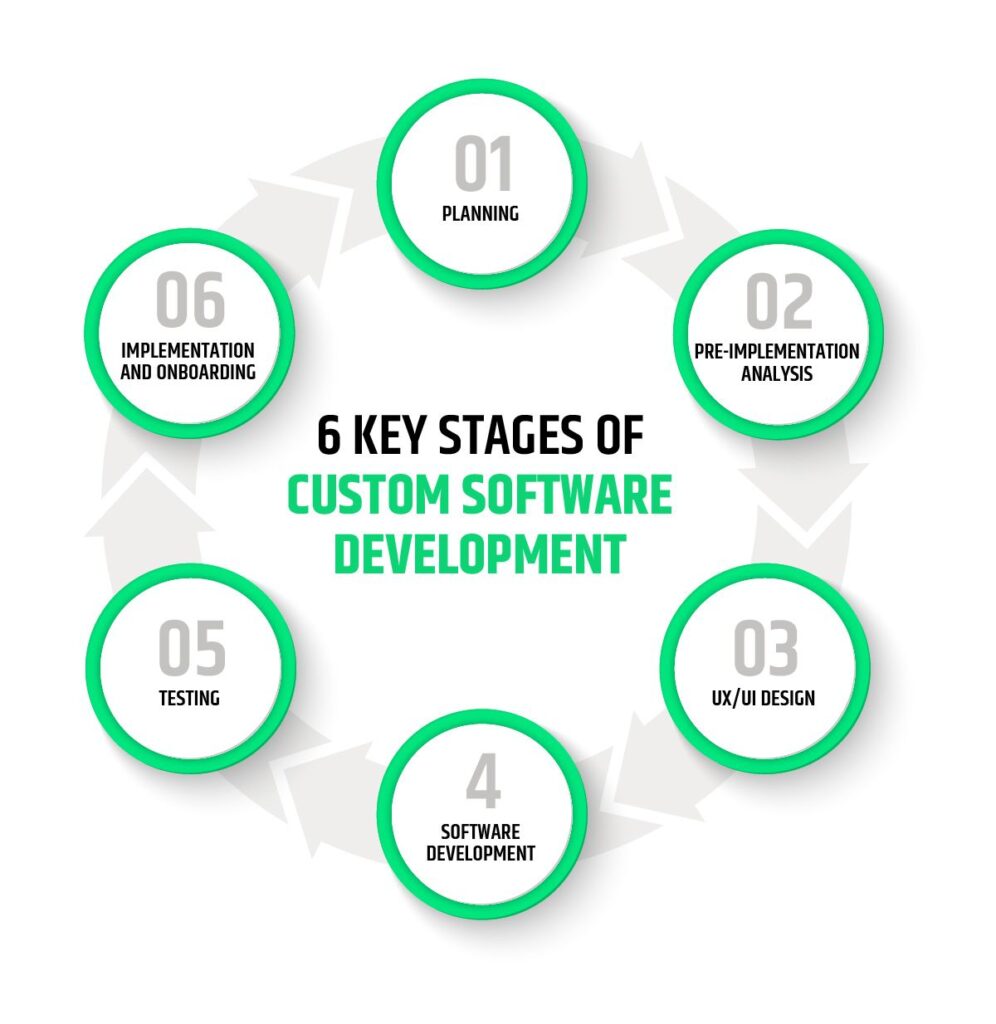Custom software solutions are specifically designed and developed to meet the unique needs and requirements of a particular business. Unlike off-the-shelf software, which is created for a broad audience, custom software is tailored to address the specific challenges and opportunities faced by a business. This customization ensures that the software aligns perfectly with the business processes, goals, and workflows, providing a seamless and efficient user experience.
Unleashing the Potential of Software Solutions for Business
In today’s fast-paced world a software solutions for any business have become essential for organizations aiming to enhance efficiency, achieve scalability, and stay ahead in competitive markets. While off-the-shelf software offers a one-size-fits-all approach, custom software solutions provide a tailored fit, addressing the unique requirements of individual businesses and delivering transformative benefits.
Here’s a breakdown of how custom software solutions can redefine operational success:
- Tailored to Your Business Needs: Custom-built applications are crafted specifically to match your workflows and processes, eliminating the need to adjust your operations to fit a rigid, pre-designed framework. This perfect alignment improves productivity, streamlines operations, and allows teams to focus on their core competencies. With customized software solutions for business, you get tools that adapt to you—not the other way around.
- Scalable to Support Growth: As your business evolves, so should your software. Custom solutions are designed with scalability in mind, ensuring they can grow alongside your organization. From adding new features to accommodating increased users, scalable software solutions for business guarantee your systems remain effective and future-ready, supporting your expansion seamlessly.
- Enhanced Data Security: Security is critical in today’s digital landscape. Off-the-shelf software is often a target for cyberattacks due to its widespread use. In contrast, custom software allows for advanced security measures tailored to your specific industry requirements. By investing in secure software solutions for business, you protect sensitive data, reduce vulnerabilities, and ensure compliance with regulations, giving you peace of mind.
- Seamless Integration Across Systems: Businesses often use a mix of software applications to manage various operations. Custom software ensures effortless integration with your existing systems, eliminating silos and streamlining data flow. This integrated software solution for business reduces manual data entry, minimizes errors, and enhances operational efficiency.
- Competitive Advantage Through Innovation: In a crowded marketplace, standing out is essential. Custom software empowers businesses to implement unique features and innovative functionalities that are unavailable in generic solutions. By leveraging innovative solutions for business, you can boost customer satisfaction, optimize workflows, and differentiate yourself from competitors.
- Cost-Effective in the Long Run: While the initial investment in custom software may seem higher, the long-term benefits far outweigh the costs. Custom solutions eliminate expensive licensing fees, workarounds, and limitations of off-the-shelf alternatives. By improving operational efficiency and productivity, cost-effective solutions for business yield significant ROI over time.
- Ownership and Full Control: With custom software, your business has full ownership and control. This means you’re not dependent on external vendors for updates, support, or modifications. The flexibility to make changes as your needs evolve ensures your software remains a valuable asset. Owning your custom software solution for business gives you the power to innovate on your terms.
Why Custom Software Solutions for Business Are a Strategic Investment?
Adopting customized software solutions isn’t just about solving immediate challenges—it’s about laying the foundation for sustained growth and innovation. By tailoring technology to your needs, you unlock unparalleled opportunities for efficiency, scalability, and success.
Optimize Your Operations Today
Whether you’re looking to streamline workflows, enhance security, or gain a competitive edge, custom software development offers the versatility and power to meet your goals. Invest in software solutions for business that drive results and set your organization apart.
Incorporating custom software solutions for business into your strategy ensures you stay ahead in today’s dynamic environment. The benefits of personalization, innovation, and control make it a transformative decision for businesses aiming for excellence.
How to Implement Custom Software Solutions
1. Needs Assessment: Charting the Course
The foundation of any successful custom software project lies in a thorough needs assessment. Meticulously analyze your existing processes, challenges, and goals. This in-depth evaluation will pinpoint areas where custom software can provide the greatest value. Actively engage key stakeholders to gather diverse perspectives and ensure a holistic understanding of your business requirements.
2. Partner Selection: Finding Your Perfect Match
Choosing the right development partner is crucial for project success. Look for a partner with industry-specific experience and a proven track record of delivering high-caliber custom solutions. Evaluate their technical expertise, development methodology, and ability to understand and translate your business needs into actionable software. A reliable partner will collaborate closely with you to ensure the software is tailored to your specific requirements.
3. Defining Success: Clear Objectives and Requirements
Once you’ve selected a development partner, work together to define clear objectives and requirements for the custom software. This collaborative effort should result in a detailed functional specification outlining the desired features, functionalities, and performance criteria. Develop a comprehensive project plan that clearly defines the project’s scope, timeline, and budget. Precise requirements management ensures the development process remains on track and delivers the intended outcomes.
4. Development and Testing: Building with Confidence
The development phase involves designing, coding, and rigorously testing the custom software. Maintain open communication with your development partner throughout this stage. This collaborative approach ensures the software aligns with your expectations and business requirements. Conduct thorough testing to identify and rectify any issues or bugs before deployment. User acceptance testing (UAT) with key stakeholders provides valuable insights to ensure the software meets the needs of its intended users.
5. Deployment and Beyond: Continuous Improvement
Once the custom software is developed and tested, it’s ready for deployment. Partner with your development team to ensure a smooth and successful deployment process. Provide adequate training and support to your employees to help them transition seamlessly to the new software. Following deployment, continuously monitor the software’s performance and gather user feedback. Regular updates and enhancements may be necessary to ensure the software adapts and evolves alongside your business needs.
Following these steps and focusing on clear objectives, a reliable development partner, and continuous improvement, you can leverage custom software development to unlock a new level of efficiency, enhance customer experiences, and propel your business towards long-term success.
How to Implement Custom Software Solutions
Out-of-the-box software can only take you so far. When businesses reach a point where their unique needs are not met by generic solutions, custom software development emerges as a powerful tool. Here, we explore real-world case studies showcasing how custom software transformed operations, enhanced customer experiences, and optimized processes across different industries.
Case Study 1: Manufacturing on Autopilot
- Challenge: A medium-sized manufacturer grappled with inefficiencies caused by their existing off-the-shelf software. The software couldn’t handle the complexity of their inventory management and production scheduling, leading to stockouts, delays, and unnecessary holding costs.
- Solution: The company invested in a custom software solution designed for their specific requirements. This tailored system integrated seamlessly with their existing infrastructure, providing real-time insights into inventory levels, production schedules, and order tracking.
- Results: The custom software led to a dramatic reduction in production delays by 25%, a significant improvement considering industry averages. By optimizing inventory management, the company minimized costs associated with excess stock by 12%, a typical benchmark for improved inventory control. Overall operational efficiency increased significantly.
Quantifiable improvements:
- Reduced production delays by 25%.
- Minimized inventory carrying costs by 12%.
Case Study 2: Retail Gets Personal
- Challenge: A retail business sought to elevate their customer experience through personalized recommendations and a seamless omnichannel experience. Their existing software lacked the capabilities to achieve these goals. Studies have shown that personalization can significantly impact customer satisfaction.
- Solution: They implemented a custom software solution that integrated with their e-commerce platform, point-of-sale system, and customer relationship management (CRM) system. This unified system provided real-time customer data, including preferences and purchase history.
- Results: The business leveraged this data to offer personalized product recommendations and targeted promotions. This customer-centric approach led to a significant increase in customer satisfaction by 15%, according to industry benchmarks on personalization. This directly translated to a 7% growth in sales, highlighting the link between happy customers and increased revenue.
Quantifiable improvements:
- Increased customer satisfaction by 15%.
- Achieved a 7% growth in sales.
Case Study 3: Financial Services – Automated and Accurate
- Challenge: A financial services firm struggled to manage their complex financial transactions, ensure regulatory compliance, and meet reporting requirements. Off-the-shelf software couldn’t handle the intricacies of their operations, leading to time-consuming manual processes and potential errors.
- Solution: They opted for a custom software solution designed to automate their financial processes, reducing manual data entry by 50%, a typical efficiency gain observed with automation. The software also offered advanced reporting capabilities, enabling them to generate accurate and timely financial reports.
- Results: Automation led to significant time savings for the firm’s staff. The reduction in errors improved data accuracy by 9%, a crucial factor for regulatory compliance. The advanced reporting features provided valuable business insights that would have been difficult to glean from manual processes.
Quantifiable improvements:
- Reduced manual data entry by 50%.
- Achieved 9% improvement in data accuracy.
These real-world examples showcase the transformative power of custom software development. By tailoring software to their specific needs, businesses can unlock a new level of efficiency, enhance customer experiences, and gain a significant competitive advantage.
Common Challenges Faced During Custom Software Development Projects
While custom software offers a multitude of advantages, the development process itself presents hurdles that need to be overcome for a successful outcome. Here’s a glimpse into some of the most common challenges faced during custom software development projects:
- Unclear Requirements Gathering: Inaccurate or incomplete understanding of the business needs can lead to a software solution that misses the mark. Thorough needs assessment and clear communication are crucial.
- Scope Creep & Budget Overruns: The project’s scope can creep as new features or functionalities are added during development. This can lead to delays and exceed the initial budget. Rigorous requirement management and well-defined project scope are essential.
- Finding the Right Development Partner: Selecting an experienced and reliable development team with expertise in your industry is critical. Look for a partner with a proven track record and strong communication skills.
- Technical Complexities: Unforeseen technical difficulties can arise during development, impacting timelines and resources. Choosing the right technology stack and experienced developers can help mitigate this risk.
- Integration Challenges: Integrating custom software with existing systems can be complex due to compatibility issues or differing data formats. Utilizing modern integration tools can streamline this process.
- Security Concerns: Data security is paramount. Custom software development allows for robust security measures tailored to your specific needs, but vulnerabilities can still exist. Regular security audits and adherence to best practices are necessary.
- Effective Project Management: Ineffective project management can lead to delays, missed deadlines, and frustration. Agile methodologies and clear communication channels between stakeholders are key to staying on track.
- Testing and Quality Assurance: Rigorous testing is essential to identify and fix bugs before deployment. User acceptance testing (UAT) ensures the software meets user needs.
- Maintaining and Updating the Software: Custom software requires ongoing maintenance and updates to address evolving needs, security threats, and bug fixes. Building a culture of continuous improvement is essential.
Acknowledging these challenges and implementing proactive measures to address them, businesses can navigate the custom software development process more effectively and achieve their desired outcomes.
Conclusion
Custom software offers a wealth of benefits, but managing development and maintenance can be complex. CloudArk simplifies the process:
- Security & Compliance: CloudArk safeguards your custom software with robust security solutions, protecting your data throughout the lifecycle.
- Streamlined Development: Our cloud platform facilitates efficient development and deployment, ensuring a smooth journey from concept to launch.
- Cost-Effective Scalability: CloudArk scales to your needs – you only pay for what you use.
- Ongoing Support: Our team provides expert support and maintenance to keep your software running smoothly and securely.
Partner with CloudArk to leverage the power of custom software with reduced complexity and enhanced security. Focus on your business while CloudArk handles the infrastructure and maintenance.
Custom software solutions, a strategic approach for the digital age, unlock long-term growth when partnered with CloudArk.
FAQ
Off-the-shelf software might seem convenient, but custom solutions can be a game-changer. They adapt perfectly to your unique business processes, unlike generic software that requires you to adjust your workflow to fit its mold. This translates to a smoother operation and a happier, more productive team.
Absolutely! That's the beauty of custom solutions. They're built from the ground up to tackle your exact challenges. Whether it's integrating with legacy systems, automating a complex task, or providing a unique user experience, custom software can be tailored to fit your needs precisely.
While the upfront cost might be higher than off-the-shelf options, custom software offers significant long-term value. You won't be paying for features you don't need, and the efficiency gains can lead to substantial cost savings down the road. Plus, with custom software, you own the intellectual property, giving you complete control and the potential to create a competitive advantage.



